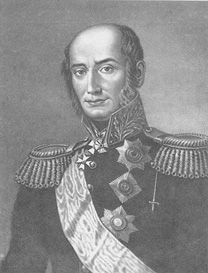 (Prince) (b. Dec. 13 [Dec. 24, New Style],
1761, Pamuskis, Poland-Lithuania [now Zeimys, Lithuania]--d. May 14 [May
26], 1818, Insterburg, East Prussia [now Chernyakhovsk, Russia]),
Russian field marshal who was prominent in the Napoleonic Wars. (Prince) (b. Dec. 13 [Dec. 24, New Style],
1761, Pamuskis, Poland-Lithuania [now Zeimys, Lithuania]--d. May 14 [May
26], 1818, Insterburg, East Prussia [now Chernyakhovsk, Russia]),
Russian field marshal who was prominent in the Napoleonic Wars.
Barclay was a member of a Scottish family
that had settled in Livonia in the 17th century. Entering the Russian
army in 1786, he served against Turkey (1788-89), Sweden (1790), and
Poland (1792-94). In the campaign of 1806-07 against Napoleon, Barclay
distinguished himself in the Battle of Pultusk and was wounded in the
Battle of Eylau, after which he was made lieutenant general. In 1808-09
he commanded Russian forces against the Swedes in Finland. From 1810 to
1812 he was Russian minister of war.
In 1812 Barclay took command of one of
two Russian armies operating against Napoleon. His strategy of avoiding
decisive action and retreating into Russia proved unpopular, and he was
forced to resign his command in favour of General M.I. Kutuzov, who
followed the same strategy.
Barclay was present at the Battle of
Borodino, left the army soon afterward, and was recalled in 1813 for
service in Germany. After the Battle of Bautzen he was made commander in
chief of the Russian forces, and after the Battle of Leipzig he received
the title of count from the emperor Alexander I. Barclay took part in
the invasion of France in 1814 and while in Paris was promoted to field
marshal. In 1815 he was commander in chief of the Russian army that
invaded France after Napoleon's return from Elba. He was made a prince
at the end of that campaign. |

